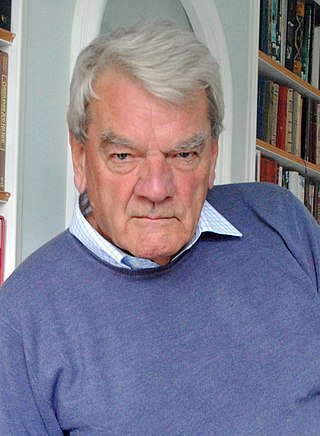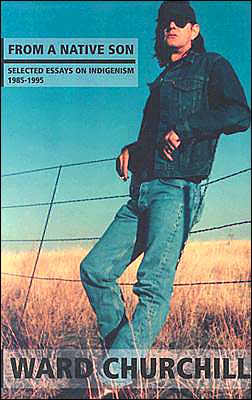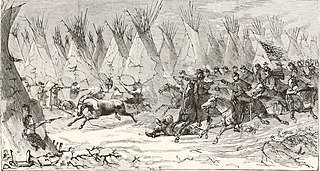Historical negationism, also called historical denialism, is falsification or distortion of the historical record. This is not the same as historical revisionism, a broader term that extends to newly evidenced, fairly reasoned academic reinterpretations of history. In attempting to revise and influence the past, historical negationism acts as illegitimate historical revisionism by using techniques inadmissible in proper historical discourse, such as presenting known forged documents as genuine, inventing ingenious but implausible reasons for distrusting genuine documents, attributing conclusions to books and sources that report the opposite, manipulating statistical series to support the given point of view, and deliberately mistranslating traditional or modern texts.
Holocaust denial is an antisemitic conspiracy theory that asserts that the Nazi genocide of Jews, known as the Holocaust, is a fabrication or exaggeration. Holocaust denial includes making one or more of the following false claims:

David John Cawdell Irving is an English author who has written on the military and political history of World War II, especially Nazi Germany. He was found to be a Holocaust denier in a UK court in 2000 as a result of a failed libel case.

Genocide denial is the attempt to deny or minimize the scale and severity of an instance of genocide. Denial is an integral part of genocide and includes the secret planning of genocide, propaganda while the genocide is going on, and destruction of evidence of mass killings. According to genocide researcher Gregory Stanton, denial "is among the surest indicators of further genocidal massacres".

Deborah Esther Lipstadt is an American historian and diplomat, best known as author of the books Denying the Holocaust (1993), History on Trial: My Day in Court with a Holocaust Denier (2005), The Eichmann Trial (2011), and Antisemitism: Here and Now (2019). She has served as the United States Special Envoy for Monitoring and Combating Anti-Semitism since May 3, 2022. Since 1993 she has been the Dorot Professor of Modern Jewish History and Holocaust Studies at Emory University in Atlanta, Georgia, US.
Harry Elmer Barnes was an American historian who, in his later years, was known for his historical revisionism and Holocaust denial.

Ward LeRoy Churchill is an American activist and author. He was a professor of ethnic studies at the University of Colorado Boulder from 1990 until 2007. Much of Churchill's work focuses on the historical treatment of political dissenters and Native Americans by the United States government, and he expresses controversial views in a direct, often confrontational style. While Churchill has claimed Native American ancestry, genealogical research has failed to unearth such ancestry and he is not a member of a tribe.

Struggle for the Land: Native North American Resistance to Genocide, Ecocide and Colonization is a book by Ward Churchill. It is a collection of essays on the efforts of Native Americans in the United States and in Canada to maintain their land tenure claims against government and corporate infringement. Equating colonization with genocide and ecocide, the author provides examples of resistance.

From a Native Son: Selected Essays on Indigenism, 1985–1995 is a 1996 book by Ward Churchill. It is a collection of 23 previously published essays on various topics relevant to the indigenous peoples of the Americas in relation to their experience of being colonized. It is introduced by Howard Zinn.

Kill the Indian, Save the Man: The Genocidal Impact of American Indian Residential Schools is a 2004 book by the American writer Ward Churchill, then a professor at the University of Colorado Boulder and an activist in Native American issues. Beginning in the late 19th century, it traces the history of the United States and Canadian governments establishing Indian boarding schools or residential schools, respectively, where Native American children were required to attend, to encourage their study of English, conversion to Christianity, and assimilation to the majority culture. The boarding schools were operated into the 1980s. Because the schools often prohibited students from using their Native languages and practicing their own cultures, Churchill considers them to have been genocidal in intent.
Justin A. McCarthy is an American demographer, former professor of history at the University of Louisville, in Louisville, Kentucky. He holds an honorary doctorate from Boğaziçi University (Turkey), was awarded the Order of Merit of Turkey, and is a board member of the Institute of Turkish Studies and the Center for Eurasian Studies (AVIM). His area of expertise is the history of the late Ottoman Empire.

The Holocaust had a deep effect on society both in Europe and the rest of the world, and today its consequences are still being felt, both by children and adults whose ancestors were victims of this genocide.

Denying the Holocaust: The Growing Assault on Truth and Memory is a 1993 book by the historian Deborah Lipstadt, in which the author discusses the Holocaust denial movement. Lipstadt named British writer David Irving as a Holocaust denier, leading him to sue her unsuccessfully for libel. She gives a detailed explanation of how people came to deny the Holocaust or claim that it was vastly exaggerated by the Jews.

David Irving v Penguin Books and Deborah Lipstadt is a case in English law against American historian Deborah Lipstadt and her British publisher Penguin Books, filed in the High Court of Justice by the British author David Irving in 1996, asserting that Lipstadt had libelled him in her 1993 book Denying the Holocaust. The court ruled that Irving's claim of libel relating to Holocaust denial was not valid under English defamation law because Lipstadt's claim that he had deliberately distorted evidence had been shown to be substantially true. English libel law puts the burden of proof on the defence, meaning that it was up to Lipstadt and her publisher to prove that her claims of Irving's deliberate misrepresentation of evidence to conform to his ideological viewpoints were substantially true.
The genocide of Indigenous peoples, colonial genocide, or settler genocide is the intentional elimination of Indigenous peoples as a part of the process of colonialism.

The connection between colonialism and genocide has been explored in academic research. According to historian Patrick Wolfe, "[t]he question of genocide is never far from discussions of settler colonialism." Historians have commented that although colonialism does not necessarily directly involve genocide, research suggests that the two share a connection.

American Holocaust: Columbus and the Conquest of the New World is a multidisciplinary book about the Indigenous peoples of the Americas and colonial history written by American scholar and historian David Stannard.

Below is an outline of articles on the academic field of genocide studies and subjects closely and directly related to the field of genocide studies; this is not an outline of acts or events related to genocide or topics loosely or sometimes related to the field of genocide studies. The Event outlines section contains links to outlines of acts of genocide.

Denial of genocides of Indigenous peoples consists of a claim that has denied any of the multiple genocides and atrocity crimes, which have been committed against Indigenous peoples. The denialism claim contradicts the academic consensus, which acknowledges that genocide was committed. The claim is a form of denialism, genocide denial, historical negationism and historical revisionism. The atrocity crimes include genocide, crimes against humanity, war crimes, and ethnic cleansing.

The destruction of Native American peoples, cultures, and languages has been characterized as genocide. The federal government alone authorized over 1,500 wars, attacks, and raids on the indigenous people within its borders. Debates are ongoing as to whether the entire process and which specific periods or events meet the definitions of genocide or not. Many of these definitions focus on intent, while others focus on outcomes. Raphael Lemkin, who coined the term "genocide", considered the displacement of Native Americans by European settlers as a historical example of genocide. Others, like historian Gary Anderson, contend that genocide does not accurately characterize any aspect of American history, suggesting instead that ethnic cleansing is a more appropriate term.














